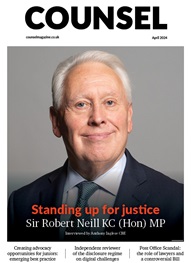*/

Before coming to the Bar I was a volunteer manager, then a sports administrator before becoming a personal trainer and spending ten years building a franchising company for personal trainers. While not a traditional legal pathway, it taught me how to run a business and gave me a different perspective on relating to commercial clients. Here are some of the lessons I have learnt.
Our training focuses on law and legal argument. This is of little concern to many clients. Most will take our legal competence as a given, especially commercial clients who regularly use consultants.
Instead, successful companies focus on the bottom line. Profits are built on good reputations, efficient use of resources and strong relationships with clients. A barrister who demonstrates appreciation of these commercial priorities will quickly build rapport with clients.
Showing you understand your client starts simply, with universal skills. Listen carefully. Answer directly. Know your case. These are familiar to us all. Finesse comes in their application, especially with commercial clients.
Your client is likely to be an expert in their field. It is unlikely that you are. So don’t be afraid to ask technical questions to build the knowledge you need for a case. It is not a sign of weakness.
Make efforts to have a general appreciation of the business world. Most barristers don’t have the experience of running or managing a company, so here are a few quick ways to grow your commercial perspective.
Firstly, the business section of a weekend newspaper is a great place to start. These pages will summarise the latest government business policy, major developments for significant companies and the state of the markets. It will exercise your business mind and is useful knowledge to drop into conversation, as appropriate.
Secondly, read Freakonomics by Dubner and Levitt. It is a light-hearted but thought-provoking introduction to behavioural economics. It revolutionised the way I think about incentives, unintended consequences and interactions across all sectors of society. It even helped me get pupillage as ‘a book I had recently read’. This is a gateway to the many books and podcasts on all aspects of micro and macroeconomics.
Thirdly, review your own practice as the small business that it is. It could be of personal benefit as well as developing a more commercial way of thinking. For example:
In exhibiting your commercial awareness, don’t avoid giving a clear and frank legal analysis. This will build confidence that you are the legal expert your client is paying for. But then move beyond this to explore the overall impact on the business with your client:
Habitually adopting a ‘client’s eye’ approach lets you provide robust legal advice combined with commercial pragmatism. It builds better relationships so that your client and you can decide the best way forward.

Before coming to the Bar I was a volunteer manager, then a sports administrator before becoming a personal trainer and spending ten years building a franchising company for personal trainers. While not a traditional legal pathway, it taught me how to run a business and gave me a different perspective on relating to commercial clients. Here are some of the lessons I have learnt.
Our training focuses on law and legal argument. This is of little concern to many clients. Most will take our legal competence as a given, especially commercial clients who regularly use consultants.
Instead, successful companies focus on the bottom line. Profits are built on good reputations, efficient use of resources and strong relationships with clients. A barrister who demonstrates appreciation of these commercial priorities will quickly build rapport with clients.
Showing you understand your client starts simply, with universal skills. Listen carefully. Answer directly. Know your case. These are familiar to us all. Finesse comes in their application, especially with commercial clients.
Your client is likely to be an expert in their field. It is unlikely that you are. So don’t be afraid to ask technical questions to build the knowledge you need for a case. It is not a sign of weakness.
Make efforts to have a general appreciation of the business world. Most barristers don’t have the experience of running or managing a company, so here are a few quick ways to grow your commercial perspective.
Firstly, the business section of a weekend newspaper is a great place to start. These pages will summarise the latest government business policy, major developments for significant companies and the state of the markets. It will exercise your business mind and is useful knowledge to drop into conversation, as appropriate.
Secondly, read Freakonomics by Dubner and Levitt. It is a light-hearted but thought-provoking introduction to behavioural economics. It revolutionised the way I think about incentives, unintended consequences and interactions across all sectors of society. It even helped me get pupillage as ‘a book I had recently read’. This is a gateway to the many books and podcasts on all aspects of micro and macroeconomics.
Thirdly, review your own practice as the small business that it is. It could be of personal benefit as well as developing a more commercial way of thinking. For example:
In exhibiting your commercial awareness, don’t avoid giving a clear and frank legal analysis. This will build confidence that you are the legal expert your client is paying for. But then move beyond this to explore the overall impact on the business with your client:
Habitually adopting a ‘client’s eye’ approach lets you provide robust legal advice combined with commercial pragmatism. It builds better relationships so that your client and you can decide the best way forward.


Sam Townend KC explains the Bar Council’s efforts towards ensuring a bright future for the profession
Giovanni D’Avola explores the issue of over-citation of unreported cases and the ‘added value’ elements of a law report
Louise Crush explores the key points and opportunities for tax efficiency
Westgate Wealth Management Ltd is a Partner Practice of FTSE 100 company St. James’s Place – one of the top UK Wealth Management firms. We offer a holistic service of distinct quality, integrity, and excellence with the aim to build a professional and valuable relationship with our clients, helping to provide them with security now, prosperity in the future and the highest standard of service in all of our dealings.
Is now the time to review your financial position, having reached a career milestone? asks Louise Crush
If you were to host a dinner party with 10 guests, and you asked them to explain what financial planning is and how it differs to financial advice, you’d receive 10 different answers. The variety of answers highlights the ongoing need to clarify and promote the value of financial planning.
Most of us like to think we would risk our career in order to meet our ethical obligations, so why have so many lawyers failed to hold the line? asks Flora Page
If your current practice environment is bringing you down, seek a new one. However daunting the change, it will be worth it, says Anon Barrister
Creating advocacy opportunities for juniors is now the expectation but not always easy to put into effect. Tom Mitcheson KC distils developing best practice from the Patents Court initiative already bearing fruit
National courts are now running the bulk of the world’s war crimes cases and corporate prosecutions are part of this growing trend, reports Chris Stephen
Let’s hear it for the assessors, says Dame Anne Rafferty of the KC Selection Panel. And to make silk assessors’ lives a little easier when applicants come calling in May, Dame Anne fields some commonly asked questions